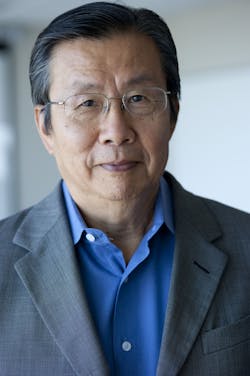Should I work in one field while pursuing a Ph.D. in another?

Q: I have been accepted into a doctoral program to work on network architecture. Given the state of the telecom industry, should I stay on my current job developing display systems? The display industry has a bright future but it's hard for me to make career advancements without a doctorate.
A: An obvious recommendation, based on what you stated, is to keep applying to other doctoral programs until you get into one with a specialty that excites you. At an intellectual level, it does not matter what thesis topic you work on because a degree does not preclude you from getting into other fields. A good part of the benefit of getting a Ph.D. is the process of learning how to dig deep into a new subject. Practically speaking though, you may want to pick hard sciences to give you more flexibility because it is hard to predict which field will be "hot" when you graduate. For example, it is a lot easier to migrate into network architecture if you have a degree in materials science than it is the other way around.
Q: We have repositioned our telecom startup to pursue the development of new lasers and laser applications. Additional funding from original venture-capital investors earlier this year should last another 18 months. What is your advice to me as CEO in this situation?
A: It is important to have an objective evaluation of how realistic your business plan is; getting follow-on investments from your original investors is not necessarily a validation of your business model. Another recommendation is to slow down the burn rate to buy more time with the money in hand; your investors may not have a sympathetic ear the next time around. The third recommendation is to build a close working relationship with your investors to help them develop an intuitive understanding of your business. Given that your situation is not unique, let me elaborate.
Venture capitalists who invested heavily during the bubble are in trouble with their investors. Some want to delay writing off their investments to make themselves look better to their investors; others cannot admit they had bad judgment. Whatever the reason might be, you want to avoid "cheering each other on" while making matters worse by being overly optimistic; the key to building a successful business is to make a series of correct moves based on a realistic assessment.
Once you understand the reality of the new opportunity, it is likely you will want to prolong the "runway," because our industry is notorious for business development to have a long gestation period. You want your investors to come to the same conclusions so they have some ownership of that decision. They are much more likely to invest again if they know what to expect, instead of getting tired of listening to the "excuses" for unmet goals, even though the goals are based on unrealistic expectations derived from exuberance.
Q: Why is it not a good thing to have too much venture money chasing deals?
A: This is counter-intuitive—why wouldn't it be a good thing for entrepreneurs when it is easier to raise venture money? Since good ideas are hard to come by, it makes it very difficult to succeed when there are many companies pursuing very similar ideas. The likely outcome is few winners and many losers. This situation makes it difficult even for the clear winner because there will be confusion in the marketplace when every pitch sounds good. Not only that, people are likely to take the easy way out by dropping the price to buy business when revenue generation is a key measure for investors to provide additional funding.
About the Author
Milton Chang
MILTON CHANG of Incubic Management was president of Newport and New Focus. He is currently director of mBio Diagnostics and Aurrion; a trustee of Caltech; a member of the SEC Advisory Committee on Small and Emerging Companies; and serves on advisory boards and mentors entrepreneurs. Chang is a Fellow of IEEE, OSA, and LIA. Direct your business, management, and career questions to him at [email protected], and check out his book Toward Entrepreneurship at www.miltonchang.com.
